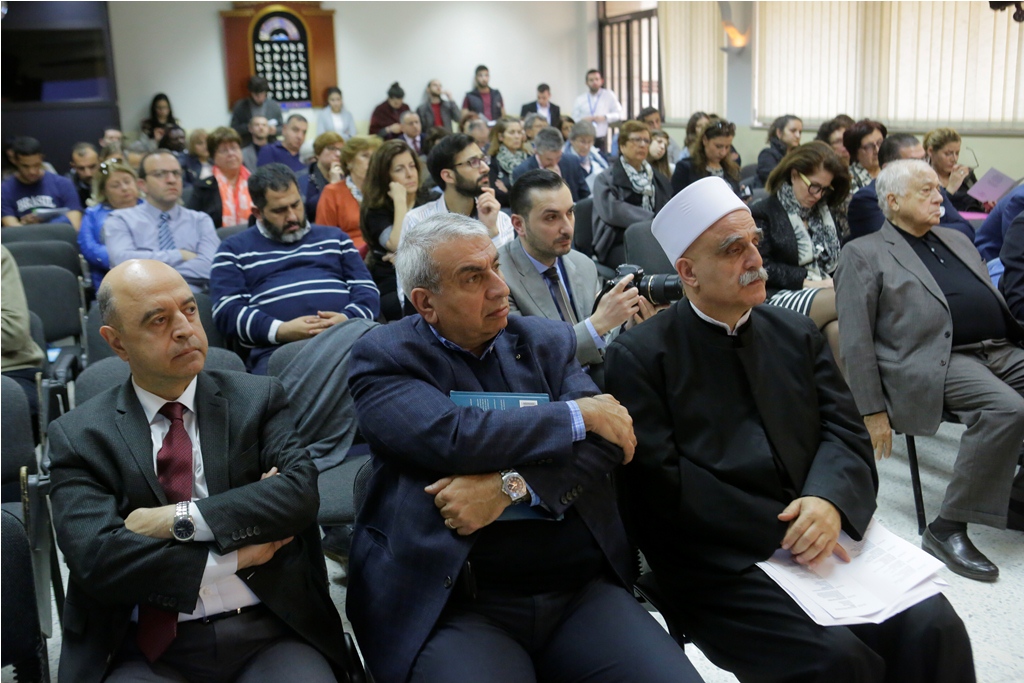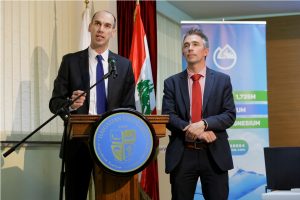Conference on “The Symbolism of Water in Religion”

The Department of Philosophy and Religion at Haigazian University organized a conference entitled “The Symbolism of Water in Religion”, which took place on Friday, the 2nd of March, 2018, from 1:30 to 4:30 p.m. in the University Auditorium. The conference, which attracted a diverse group of scholars, religious leaders, representatives of NGOs and students, explored the meaning of water in different religions and addressed the involvement of faith-based NGOs in water protection in Lebanon.
In his opening address, Haigazian University President, Rev. Dr. Paul Haidostian, considered water in religion as a symbol of life and purity. As educators, Haidostian asked to shift peoples’ mentalities and focus more on matters of quality than of quantity. “What is usually left out of the equation is the question of quality, and the needed stewardship, conscientiousness and the local and regional strategies that could to be developed, funded and implemented”, he said.
First to speak was Dr. Reine Youssef, Lecturer in Environmental Science at Haigazian University, who, in her presentation entitled “Our Water… Our Gold”, outlined some of the major challenges Lebanon faces regarding water scarcity and quality.
Three consecutive presentations shed light on the importance of water and its symbolism in religion.
Dr. Hosn Abboud, Lecturer in Literature at the American University of Beirut, spoke about “Water as a Source of Life in the Holy Quran”; she traced the meaning of water in the Holy Quran, concluding that water is considered as a sacred gift from God for many aspects of life.
Sheikh Dr. Sami Abilmona, Secretary General of the IRFAN Foundation, approached the Islamic theology of water from a Druze point of view. Abilmona emphasized the responsibility people bear for the preservation of water, describing it as “the grace of the earth, the gift from heaven and the bond between them”.
A paper entitled “Water as a Sign of Reconciliation in the Christian Faith”, analyzing the Christian perspective on Water, was read by Caleb Hutcherson, Lecturer in Historical Theology at the Arab Baptist Theological Seminary, and Wilbert van Saane, Lecturer in Religion at Haigazian University. Both speakers covered the water imagery in Christian baptism, conveying that a balanced, holistic baptismal theology is essential for good creation care.
The second part of the conference tackled the practical issues relating to Water.
Chris Naylor, the Executive Director of A Rocha International, a Christian NGO for conservation, affirmed that creation care is a key task of the church. In his intervention titled “Water, Bringer of Life for People and Wildlife”, Naylor presented the case study of the Aammiq Wetland Conservation Project, which demonstrates what can be achieved if concerted effort is given to reversing water degradation and misuse by communities.
For his part, Björn Zimprich, who works on behalf of the Deutsche Gesellschaft für Internationale Zusammenarbeit on water efficiency in Jordan, discussed how cooperation among various Jordanian Government Ministries and religious leaders has led to increased water awareness and efficiency. Zimprich gave the example of the Friday sermons in mosques and religious education in schools and universities, where the issue of water awareness is highly advocated.
Two participants partook in a panel that addressed the most pressing issues regarding water in Lebanon and the role of faith-based NGOs in water protection. The panel was moderated by Dr. Arda Ekmekji, Dean of the Faculty of Arts and Sciences at Haigazian University.
Dr. Désirée El Azzi, Assistant Professor in Hydrology, Soil and Environment at the Holy Spirit University of Kaslik, discussed the issue of water scarcity, describing it as a pressing problem especially in view of the growing population. She went further to identify the absence of environmental resource management strategies as a second major problem, resulting in continuous infiltration of pollutants. Dr. El Azzi put significant importance on religious organizations, in being the voice of marginalized groups who have been hit hardest by the lack of clean water.
Dr. Nadim Farajalla, Director of the Climate Change and Environment Program at the Issam Fares Institute for Public Policy and International Affairs at the American University of Beirut, expressed the urgency of better managing the water sector in Lebanon, stressing on the importance of limiting water waste and improving water supply. The role of faith-based organizations lies, in his view, especially in sensitizing people and supporting government and non-government actors where possible.
An interactive session of Q&A followed, allowing the audience to participate in stimulating discussions.




 Արևելահայերեն
Արևելահայերեն Արևմտահայերեն
Արևմտահայերեն Русский
Русский







